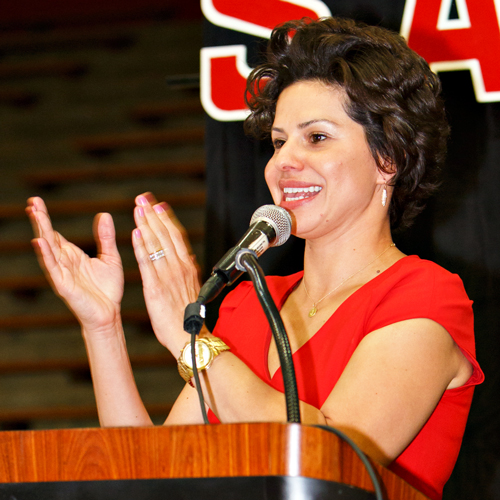Though she started her studies in her hometown of Medellin, Colombia, Maria Mejia had a fascination with international trade that took her to Dallas in 1999 for a six-month internship and then on to University of Texas–Arlington in 2000. Her education, as well as her career, has kept her in the United States ever since. But as CFO for drill bit manufacturer Ulterra, she finds herself at a company that’s ever more eager to tap the international side of her expertise.
Founded in 2005, sales were already at $110 million when Mejia came on board as corporate controller in 2010; four years later, those numbers topped $300 million. And the 120 or so employees that made up Ulterra back then? That number increased to 600.
“We’ve had to learn to act quickly; to change and react faster than all our competitors,” Mejia says of her team. “We’re comprised of people—especially in the operations and engineering side—that came from those big competitors that thought there was a better way of doing things. Our way is much less bureaucratic and much more fast-paced . . . we’re a group of people that care for each other, and are accountable to each other.”
That mind-set is easily reflected in Mejia’s management style, which encourages autonomy from her team of twenty-nine. As long as they keep her in the communication loop, all is well.
“I’m a financial advisor, not a scorekeeper,” Mejia says. “I just don’t want to be studying a report three months down the road and have to say [to my team], ‘Okay, what did you guys do?’ Before you pull a plug somewhere, just let me know in case I need to tell you you’re going to disconnect everybody. We have ‘operationalized’ accounting, pushing the true fiscal responsibility to operations by working as a team, not by keeping score at the end of the month.”
Mejia is quick to mention the culture of communication and collaboration at Ulterra, pointing to departmental successes such as the anti-vibration tool known as Counterforce. This 2013 invention for the drill-bit industry, which helps preserve other equipment by reducing vibrations, was designed by a small team of Ulterra engineers as the solution to a long-standing customer issue.
It’s not just technical issues at Ulterra that are customer focused. The development of a centralized inventory system that allows a customer’s specific drill bit needs to be met quickly fits the same model. The process has boosted inventory utilization to record levels, Mejia says. “It’s about determining what a customer needs quickly, and coming up with the perfect product for the perfect application every time.”
Ulterra’s efficiency and precision was initially very concentrated on operations in the United States and Canada. During Mejia’s tenure, the company has made considerable headway in international locales such as Saudi Arabia, Mexico, and Colombia. Such rapid expansion has kept Mejia on her toes setting up legal entities, checking infrastructures, and balancing FPA concerns by ensuring they operate within a legal and ethical framework wherever they’re at.
Her international experience—which includes, especially in the case of her homeland, a deep familiarity with the language and currency—definitely gives Ulterra’s accounting side the upper hand. “My being from Colombia, and having the experience with its workforce framework . . . it certainly has helped us do it correctly and properly from the get-go,” Mejia says.
Market shares tell the story of Ulterra’s success in terms of global representation, with highlights including its standing as the number-one drill bit supplier for both Colombia’s Ecopetrol and Thailand’s PPT. “Saudi Arabia is our biggest international customer, though,” Mejia reports. “There’s still a lot of drilling activity there, even during a downturn.”
“I’m a financial advisor, not a scorekeeper. Before you pull a plug somewhere, just let me know in case I need to tell you you’re going to disconnect everybody.”
Maria Mejia
That downturn, which sent still-recovering gas prices plummeting in the last quarter of 2014, left Ulterra with the same difficult downsizing decisions as the rest of the oil industry’s top businesses. But unlike their competitors, Mejia says they made all their cuts quickly—eliminating the worry of “will I have a job tomorrow” for remaining employees, and leading consequentially to higher morale and higher market share.
“Those that stayed were very conscious they’d been selected to take the company back to full growth mode,” she notes. “They’re really excited to be here. I don’t think they’re excited about the cuts, but we reacted quickly to the situation, made the cuts, and just moved on from there.”
A more ongoing challenge can be found in Ulterra’s ownership history: a merger in 2008, three years after its founding, a sale to ESCO Corporation in 2012, and another sale to private equity firm American Securities in 2016. Each shift is felt profoundly by the financial teams in place at any given time, but Mejia speaks of her staff’s adaptability from a place of pride. “That change in ownership . . . I think it shows how resilient our culture is, and how tight this company is,” Mejia says. “It’s definitely been challenging from the outside looking in, but then again, people here just thrive on change.”
With international expansion becoming even bigger for Ulterra in the next five years—particularly in Asia—an ability to embrace change is more imperative than ever. As might be guessed for Mejia, that ability is one of her most valuable strengths. “It will be a challenge learning new territories, culture, and so on,” she admits. “But it’s definitely a challenge I’m excited to face.”
At this point, she has her own history with Ulterra as proof of what she’ll be able to do in the future. “I guess expertise is more than actually saying that I can build infrastructure on my own,” Mejia says. “I can assemble a team to get us through a process. That’s why I’m here.”

